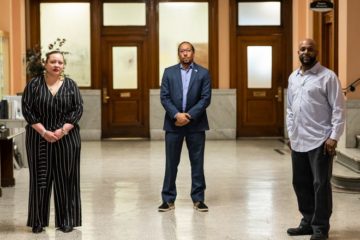February 23, 2021
Dear Mayor Petty, Manager Augustus and City Council,
My name is Isabel Gonzalez-Webster and I am the Executive Director of Worcester Interfaith. WI works to address systematic and institutional Racial, Economic and Health Inequity issues. We do this through organizing in coalition with partners locally, State-Wide and Nationally. We have been working on Racial Justice and Police Reform since I took over the organization. Nationally we have been working on Criminal Justice Reform, Restoration and Reparations with our Partners across the country. In Massachusetts we worked to pass the state-wide racial justice and police reform bill. We lobbied our state legislators, met with our partners, had organizing and delegation meeting in Worcester. We wanted to make sure that not only was Worcester supporting and advocating for the bill with our state delegation and conference committee, but that they understood the bill and the changes that were occurring along the way. We were involved in the state-wide police reform bill process until the last bit of the negotiations with the Governor. The weekend before the Governor signed the bill into law, Worcester Interfaith participated in vigils in the front of the homes of Senate President Spilka, House Speaker Deleo, and Governor Baker. I remember how cold it was as we sang and chanted in front of Spilka’s house until she came out to speak to us.
After months of organizing in Worcester, City Manager Ed August finally ended that administration’s silence and responded to the communities cries for reforms. This past Friday, The City Manager signed an executive order acknowledging the role structural and institutional racism has played and continues to play in the city. He has put forth a set of reforms seeking to address those issues.
We believe this is a start however, moving forward with any police reform must include a true and genuine community process. Communities of color are disproportionally impacted by Structural and Institutional Racism. Plans to address these issues cannot be created without having those groups, organizations and individuals in the city who have been fighting institutional and structural racism at the table.
We whole heartily support the following recommendations:
1. Removing School Resource Officers (SROs) from schools at the end of this school year and creating a school safety plan that eliminates “day to day presence” of WPD at schools
2. Banning the use of facial recognition technology
3. The creation of a “dashboard” of WPD use of force complaints and other “incidences” accessible to the general public, especially since the state police reform bill requires that this information be made public anyway.
The rest of the recommendations need further conversation with the community. There are also other asks that are not part of the recommendations that need to be discusses.
The Current Recommendation by the City Manager is to have the City handle police Investigations. This does not make sense at all. Given the Cities history in not responding or ignoring cases of racism, bias and the latest example of the city refusing to settle a 2 decades old case of two former black police officer who won their lawsuit against the city. “ The police cannot police themselves” The city is not capable of holding the WPD accountable”
The community has been asking for a Civilian Review Board with subpoena powers for decades. One of the biggest part of the statewide police reform bill is the Police Officer Standards and Training (POST) commission. This civilian-led police oversight board with subpoena power and decertification authority can independently review and investigate cases of police misconduct, have the power to certify and decertify police and can receive complaints from individuals. Complaints no longer need to come from police or state departments? This is where there is true accountability of cops. We need a similar civilian review board in Worcester.
The Manager’s Recommendations does not include adding video cameras in the drug unit. Many drugs and money go missing. WPD (unlike most other police departments in the state and country) do have video cameras to monitor the inventory of drugs, money and other confiscated materials that are processed in their drug units. We have heard from criminal defense attorneys, activist and community members that there are many who have been arrested for drug charges who have reported that they had more drugs or money on them than what the police officers and prosecutors have reported.
Thus, moving forward without community input would lead to policies that do not address the issues that affect our community or leave opportunities to learn about areas where the WPD can be improved.
Thank you,
Isabel Gonzalez-Webster
